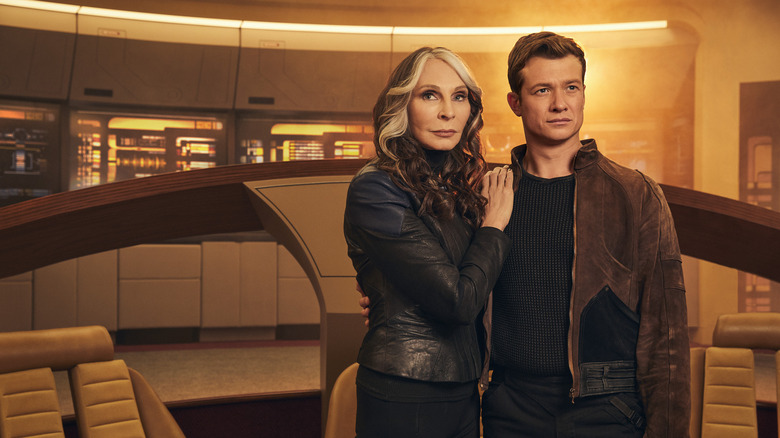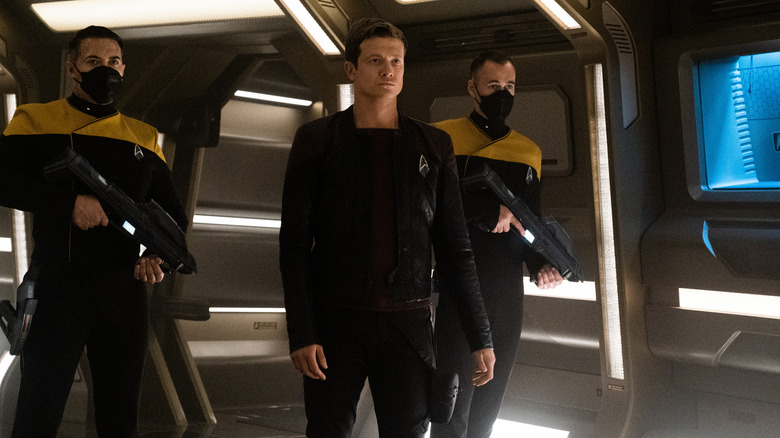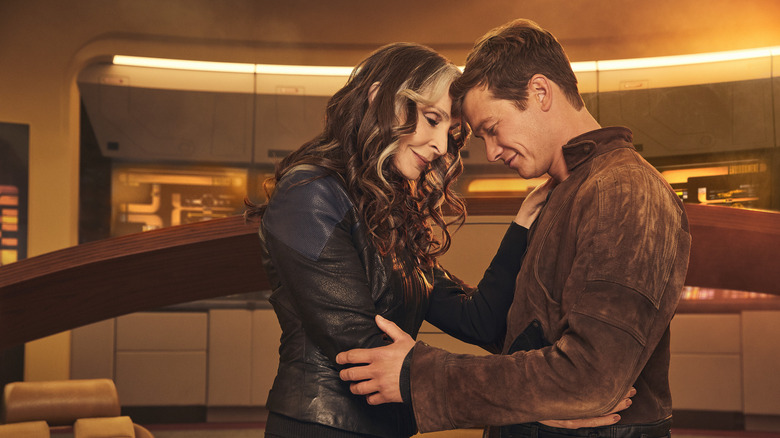Picard Showrunner Is Glad Jack Crusher Kept His Mother's Name
This post contains spoilers for the series finale of "Star Trek: Picard."
In the last episode of "Star Trek: Picard," called "The Last Generation," Jack Crusher (Ed Speleers) has given himself over to the evil Borg Queen (voice of Alice Krige) who has assimilated him into the Borg collective. He is outfitted with a wicked, black robot costume and has a metal prosthesis is bolted to his face. His mind is more or less erased, and the Queen begins using his powerful psychic brain to control a massive fleet of distant starships by remote.
Rather than merely blow him up and stop the attack, the cast of "Star Trek: The Next Generation" elect to fly the Enterprise-D into the heart of the Borg ship and rescue him. They hope to reason with the Borg Queen and appeal to Jack's seemingly erased humanity. Picard (Patrick Stewart), having once been assimilated before, is able to stand face-to-face with Jack, plug a wire into the back of his neck, and have a psychic conversation with him. Technically, he is uniquely qualified to pull Jack's consciousness out of the machine.
Jack, it should be noted, is Picard's son, a child he fathered some 20 years before with Dr. Beverly Crusher (Gates McFadden). Dr. Crusher has been raising Jack alone, never having told Picard that he had a child. She did this because Picard is constantly in danger and his child would likely be at risk. Hence why he is named Jack Crusher and not Jacques Picard.
It seemed a little unfair to Beverly, then, that Picard should be the one who is uniquely qualified to rescue Jack. Why dad and not mom?
Showrunner Terry Matalas, in a recent roundtable interview attended by /Film's Vanessa Armstrong, also sensed the injustice and declared that Jack, in keeping his mother's name, was doing the correct and logical thing.
Jack Crusher
While the show is called "Star Trek: Picard," and the title character should play a major part in a series finale, it did feel a little ... off ... to have Picard be the one to rescue Jack from the Borg Queen. Picard previously only had a relationship with the villainess, and it might be fitting that he confronts her after decades of animosity. But he had only met Jack a few days prior. The two had spoken a lot, and Picard had come to terms with the fact that he had an adult son, but their relationship wasn't particularly deep or even all that warm. Indeed, Jack had been told since he was a child that Picard was kind of a heel, being cold and neglectful. It would have made more sense that Jack resent Picard, returning to Dr. Crusher at the first available opportunity.
Matalas spoke a great deal about how names — and, by extension, legacies — are a vital part of the third season of "Star Trek: Picard." What people call themselves, and what they insist others call them, speaks a great deal to their identities. In retaining the name Crusher, Jack was ultimately his mother's child and not his father's. Here's how Matalas answered when asked about how names come into play in the season finale:
"I have to sit back and meditate on that for quite a bit because it does ask a lot of questions about family. Picard and ... it makes me think about things, like I am glad that Jack never took the name Picard at the end, that he keeps his mother's name, and I think that that's super important."
Legacy
The first half of the third season of "Picard" was pointedly anti-legacy. Picard spent his first few scenes packing up all his old trinkets into boxes and shipping them out of his home. He and Riker (Jonathan Frakes) were not treated with rarified respect. Even the Enterprise-D is badmouthed in dialogue. Eventually, however, the themes did a 180, and legacy became incredibly important. Old characters reunited, references to the past piled up, and the Enterprise-D was rebuilt. Terry Matalas acknowledged this by saying Jack Crusher's line, "Names mean almost everything," reflected this shift. "First, it was really a nod to nepotism," he said, "because we knew we were flashing forward to the fact that Jack Crusher was going to be accelerated through Starfleet. You have to call it what it is. And so that started that."
Matalas went on to say that legacy is everything for these characters, in both big and small ways. The name Enterprise is important for everyone in "Star Trek," of course, and he was careful to place it in the hands of a familiar, deserving character. In his words:
"But it was also about the importance of the name Enterprise, and what that particular legacy was, for not only Starfleet, but for the fans. And in a lot of ways that was the last character missing from the scene. It was the final character added to the ensemble when we brought back the Enterprise-D, and the final character given to Seven of Nine. That was super important for us, for Seven and Raffi to be at the forefront of that legacy, of the Enterprise legacy."
Someone clearly wants to make a show called "Star Trek: Legacy."


